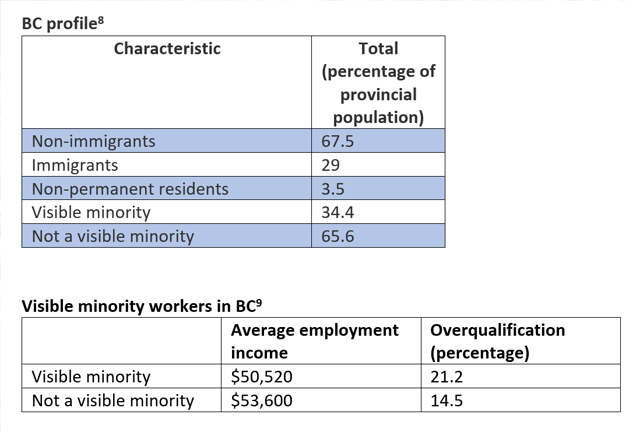Reprinted from the Is It Safe to Be Me? Creating inclusive and accessible workspaces issue of Visions Journal, 2024, 20 (1), pp. 24-25

Show up to work in December, and your workplace or office space may be festooned with lights, Christmas trees and red-and-green Christmas holiday décor. Perhaps your workplace organizes a Secret Santa gift exchange for the annual Christmas party. During Easter, your employer might organize an Easter egg hunt. Come October, colleagues may dress up in spooky costumes around Hallowe'en.
Several of the statutory holidays observed provincially and federally are based on Christian days of significance, such as Christmas and Easter. Many workplaces in BC openly celebrate these Christian holidays, or holidays that have European roots. Yet, there are many holidays that British Columbians celebrate that are not acknowledged or accommodated in the workplace—Eid, Kwanzaa and Vaisakhi are some examples—despite the diversity of people who call this province home.
I am a Sikh, Punjabi woman who grew up as a second-generation immigrant settler in the Lower Mainland. Like many others of my faith, I celebrate Sikh holidays such as Bandi Chhor Divas, Diwali and Vaisakhi. One year, when I asked a previous employer to make accommodations for me to celebrate Bandi Chhor Divas and Diwali, my request was refused. Although I had support from my union and a Sikh organization advocating on my behalf, the issue dragged on. It left me feeling disheartened, with low morale, and that my beliefs did not matter—I felt that who I was, was not celebrated or even tolerated. I was anxious that I would be seen as a nuisance or a problem1 at work, and I felt stressed. I enjoyed my work and interactions with my colleagues, but on some days I would collapse in a heap on my couch after work, mentally drained and exhausted. In short, the issue impacted my mental health.
Our province is incredibly diverse. Racialized peoples make up almost 34 percent of the provincial population, and immigrants make up 29 percent.2 Despite these numbers, racialized workers are discriminated against in the labour force. For example, racialized workers make less average income than white workers3 and are more likely to be overqualified for the jobs they have.4 Racialized workers also face other forms of systemic discrimination at work, such as discrimination in the hiring process or maltreatment by others. We know that systemic racism and discrimination can impact people's mental health and well-being.
Workplaces must abide by human rights statutes. Section 13 of the BC Human Rights Code5 enshrines your right to be treated fairly at work and not be discriminated against because of your ancestry, religion, Indigenous identity, gender, age and more. Employers have a legal duty to accommodate a worker's needs, such as religion or accessibility needs, to the point of undue hardship. This means employers must accommodate until it becomes too difficult, unsafe or expensive to do so.6 Yet, despite these legal protections, there are systemic challenges for diverse communities with regards to celebrating days that are significant to them.
It starts with advocacy
Despite these systemic challenges, there are ways you can advocate for yourself and your colleagues. Awareness is key. You can:
Build excitement. For example, you might build a calendar with your colleagues to learn more about each other and days that might be significant for each of you. You can also write to your marketing or communications department and ask them to share messaging marking celebratory days on their internal and external communications channels. If you're in a leadership position, you can poll your staff with an optional survey to find out what dates are important to your team and how you can best support your team members.
Get specific. Your workplace cannot make accommodations for you if it doesn't know what's important to you. If there are specific religious holidays you celebrate, discuss their importance for you with your supervisor or manager. Together, you can explore how accommodations can be made. For example, perhaps you can substitute another day for a statutory holiday,7 an option outlined in BC's Employment Standards Act.
Aim for flexibility. If there's flexibility in your schedule, you might be able to take a day off and make up that time elsewhere in your work week. Employers can also explore other options, such as offering flexible personal days for workers to take additional time off. If you're in a unionized position, you can also contact your union representatives to discuss ideas.
An inclusive and equitable workplace leads to better mental health for employees. We live in a time where "diversity," "equity" and "inclusion" are buzzwords we hear when talking about societal institutions, be it healthcare, academia, the justice system or others. Turning buzzwords into real change at the workplace requires more than just lip service. Workplaces must do better. Employers, including supervisors, managers and leaders, play a critical role in ensuring equity in the workplace, creating an inclusive work culture and promoting diversity. Creating safe spaces for open communication between workers and employers is key.
Religious accommodations are an important issue affecting workers' experiences and equity in the workplace, but it is one issue among many, including hiring, promotion and retention policies, compensation, training and mentorship opportunities, and many more. Small steps, like proactively acknowledging, accommodating and welcoming our differences, help address systemic inequities and go a long way towards creating workplaces where workers not only show up, but can show up as their full selves and thrive.
About the author
Kamal holds a PhD in anthropology and works in equity, diversity and inclusion in public health. Kamal is the former editor of Visions Journal
Footnotes:
-
For an interesting discussion around women of colour and non-profit organizations, see: coco-net.org/problem-woman-colour-nonprofit-organizations.
-
Statistics Canada. 2023. (table). Census Profile. 2021 Census of Population. Statistics Canada Catalogue no. 98-316-X2021001. Ottawa. www12.statcan.gc.ca/census-recensement/index-eng.cfm.
-
Statistics Canada. (2024). Table 98-10-0642-01. Average and median employment income by visible minority, selected sociodemographic characteristics and the census year: Canada, geographical regions of Canada, provinces and territories and census metropolitan areas with parts. DOI: doi.org/10.25318/9810064201-eng.
-
Statistics Canada. (2024). Table 98-10-0650-01 Overqualification (based on skill level C and D) by visible minority, selected sociodemographic characteristics and the census year: Canada, geographical regions of Canada, provinces and territories and census metropolitan areas with parts. DOI: doi.org/10.25318/9810065001-eng.
-
Human Rights Code, RSBC 1996, c 210. bclaws.gov.bc.ca/civix/document/id/complete/statreg/00_96210_01.
-
British Columbia Office of the Human Rights Commissioner. (No date). Glossary. bchumanrights.ca/glossary.
-
Government of British Columbia. (2021). Guide to the Employment Standards Act and Regulation. Substituting Another Day for a Statutory Holiday - Act Part 5, Section 48. www2.gov.bc.ca/gov/content/employment-business/employment-standards-advice/employment-standards/forms-resources/igm/esa-part-5-section-48.
-
See below: table adapted from: Statistics Canada. (2023, table). Census Profile. 2021 Census of Population. Statistics Canada Catalogue no. 98-316-X2021001. Ottawa. Released November 15, 2023. www12.statcan.gc.ca/census-recensement/2021/dp-pd/prof/index.cfm?Lang=E.
-
See below: table adapted from Footnotes 3 and 4.

